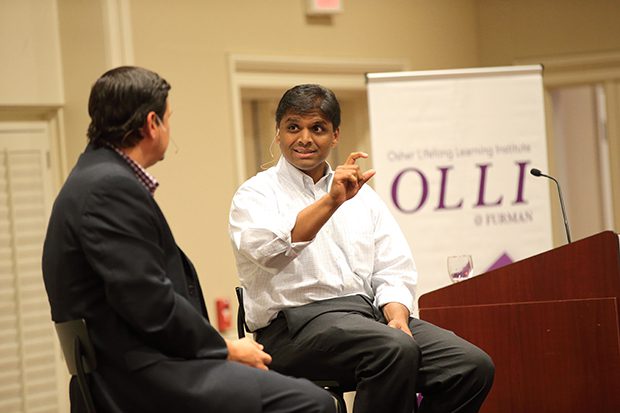The good neighbors

Breaking the cycle of poverty is not an easy task and will require systemic changes, deep interpersonal relationships with the poor, and a major investment of state and federal resources, said one of the speakers during the July 29 Straight Talk SC: Crisis of the Working Poor forum.
Mark Quinn, moderator of the four-week forum, cited a recent survey that showed 20 percent of European respondents thought the ability to improve one’s economic situation was based on working hard while 60 percent believed it was based on a person’s status at birth. In the United States, the numbers were reversed.
Dr. Danny Avula, deputy director of the Richmond, Va., Public Health Department and a 10-year resident of a low-income, high-crime neighborhood, told participants that his family’s move to North Church Hill has infused both his professional and personal life.
Following Avula’s discussion, Furman sociology professor Kyle Longest talked about barely getting by in South Carolina.
The two discussions were the second in a series of four evening forums sponsored by the Riley Institute at Furman and the Osher Lifelong Learning Institute at Furman.
Longest divided the audience into small groups and had them create a budget for a family of three living on wages from a full-time, minimum wage job. The hypothetical family also received $200 from the SNAP program for food and $100 from Temporary Assistance to Needy Families. The audience discovered how difficult it was to stretch the money and how one emergency could disrupt the entire scenario.
“To understand an individual’s decisions, we need to understand how they made those decisions within the constraints under which they operate,” he said. “They have to make choices. There will be tradeoffs.”
He pointed out that South Carolina is one of five states with no state minimum wage and that a full-time minimum wage job will not lift a family of three above the federal poverty guidelines.
Avula, an immigrant who moved from India with his family when he was a year old, initially lived in an upscale neighborhood when he graduated from college. He talked with his immediate neighbors, but “the vast majority of the people in my community were nameless faces,” he said.
He and several college roommates discussed the possibility of moving to an impoverished neighborhood and simply being good neighbors. Four couples eventually made the move.
“Gunshots were a weekly occurrence if not daily,” he said. “There were no grocery stores for miles” although plenty of small shops that sold junk food and beer were available. “Why would anybody with a choice move to this neighborhood?”
The answer, he said, was that the group missed the sense of community they had created in college.
“We’re all still there,” he said of the four families.
“I was amazed that the kids would gravitate to our house. It was a revolving door” with some in the neighborhood living with them for varying amounts of time, he said.
“All of us,” he said of the immigrants to the neighborhood, “are learning a new language, a new dialect and a new culture. I had to learn the customs of my neighbors. A lot of relationships there happen out in the street. In the first month, I had more conversations than I’d had in my previous neighborhood over the years.”
He said the four families that moved in feel changed, challenged and blessed. Although they thought they might become role models for community youngsters, it turned out they are learning as much if not more than the neighborhood residents.
“We often feel overwhelmed with the tangible needs of my neighborhood,” Avula said, adding “It’s really rare to see kids live with two parents or even have a healthy relationship with two parents.”
Also, young males in the neighborhood have difficulties.
“You spend your days doing what your peers do, hanging out on the corner,” he said. If that lasts long enough, they often get pulled into the economic engine of the neighborhood, the drug trade. Even if they don’t, they hang out with the young men who do and often end up arrested. “With each generation, these challenges become more complicated.”
Solving the problems of entrenched poverty requires “complex systemic solutions paired with deep interpersonal solutions,” Avula said. Jobs need to be created in the neighborhood. Two-parent families need to be encouraged. Residents need to be taught skills to handle conflict as well as job skills.
Gentrification is beginning in Church Hill, with more businesses opening and more middle-class families moving in. But that gentrification needs to occur without displacing all the long-term residents.
Right now, “we’ve got the hipster beards with the homeless beards,” he said. And those living there now “have some responsibility to work for the common good.
Race and class continue to be barriers, and all need to engage in conversations about these issues. “We all have a responsibility to improve the state of affairs in our communities,” he said.
He is encouraging his black middle-class friends to move back into the communities they struggled to leave.
“There’s no quick fix,” Avula said, but he believes that mixed-income, multicultural neighborhoods could be part of the solution. Also, a major investment by government will be needed to help families leave the culture of poverty behind.
For more on the Straight Talk SC: Crisis of the Working Poor series, visit rileyinstitute.org